The name of aremote island for perhaps the most famous desk calendar in the history of design. Timor: Latin has nothing to do with the calendar that Enzo Mari (Cerano, 1932 - Milan, 2020) designed in 1967 for Danese Milano, a home accessories brand founded in the 1950s. Bruno Danese, the company’s founder, had decided to name each of Enzo Mari’s objects in the catalog after an island, and the famous calendar had fallen to that of a well-known island in the Malay archipelago, the largest of the Small Sunda Islands, now divided between Indonesia and the state of East Timor. Interestingly, in the Malay language, the local idiom, “Timor” actually means “east.” The calendar named after an Asian island has over time become an emblematic example of Enzo Mari’s design philosophy , as well as his mastery as a designer.
Timor represented, meanwhile, a turning point in the very concept of a desk calendar. It is, meanwhile, a perpetual, infinite calendar that is updated daily simply by changing the bands with days and months. It was not the first of its kind: it was preceded by Formosa, designed in 1962 also by Enzo Mari, and before that by Bilancia, another of his creations, from 1959. They were, however, both wall calendars: Timor was the first one that could be placed on a table, on a shelf, on a shelf in general, and moved at will without difficulty. Besides, Mari was known for his rational approach and attention to functionality, and he designed Timor with the intention of creating an object that was both practical, aesthetically pleasing, elegant, and durable. The inspiration for Timor’s design came from observing old railroad signs, those with the names of the stops inside the stations, an image that, to the then 35-year-old designer from Piedmont, stirred childhood memories. But many also find animal forms in Timor, for example those of a bird with a large beak (such as a pelican, or a toucan): after all, it is well known that Mari also found inspiration in nature. In any case, Mari applied this mixture of clarity, immediacy, and memories to the creation of his perpetual calendar, resulting in a unique and revolutionary design object. “Form corresponds to the meaning of an object, to the reason why an object is made, and represents, if well made, its highest quality,” Enzo Mari said in aninterview. “The problem with form is to search for its essence. [...] Design is design if it communicates knowledge.”
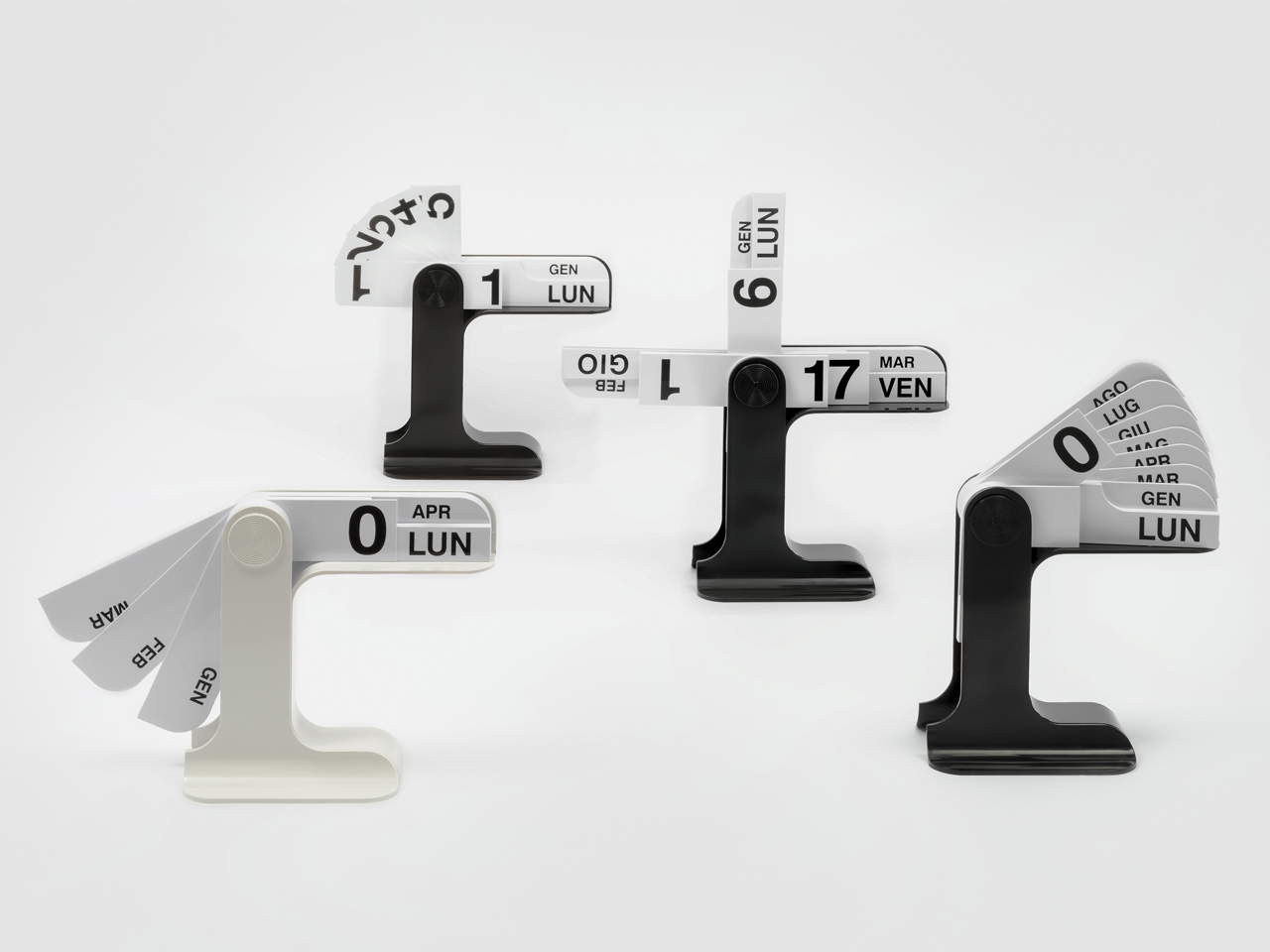
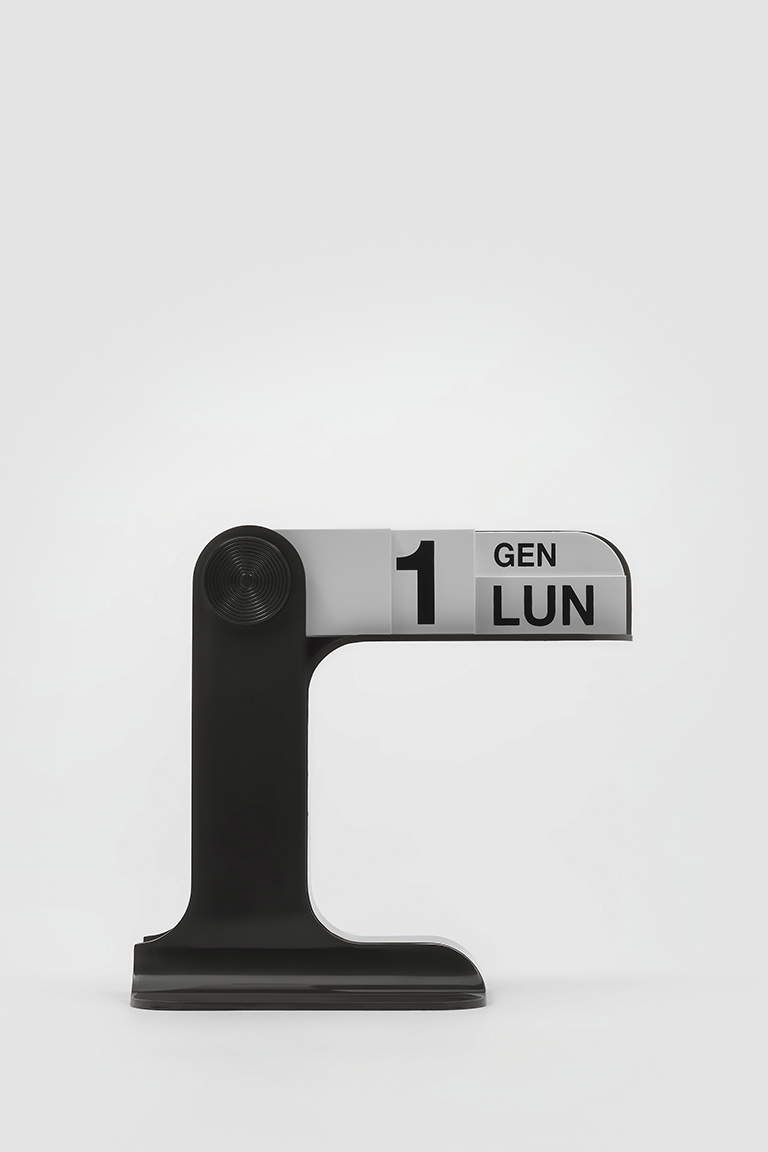
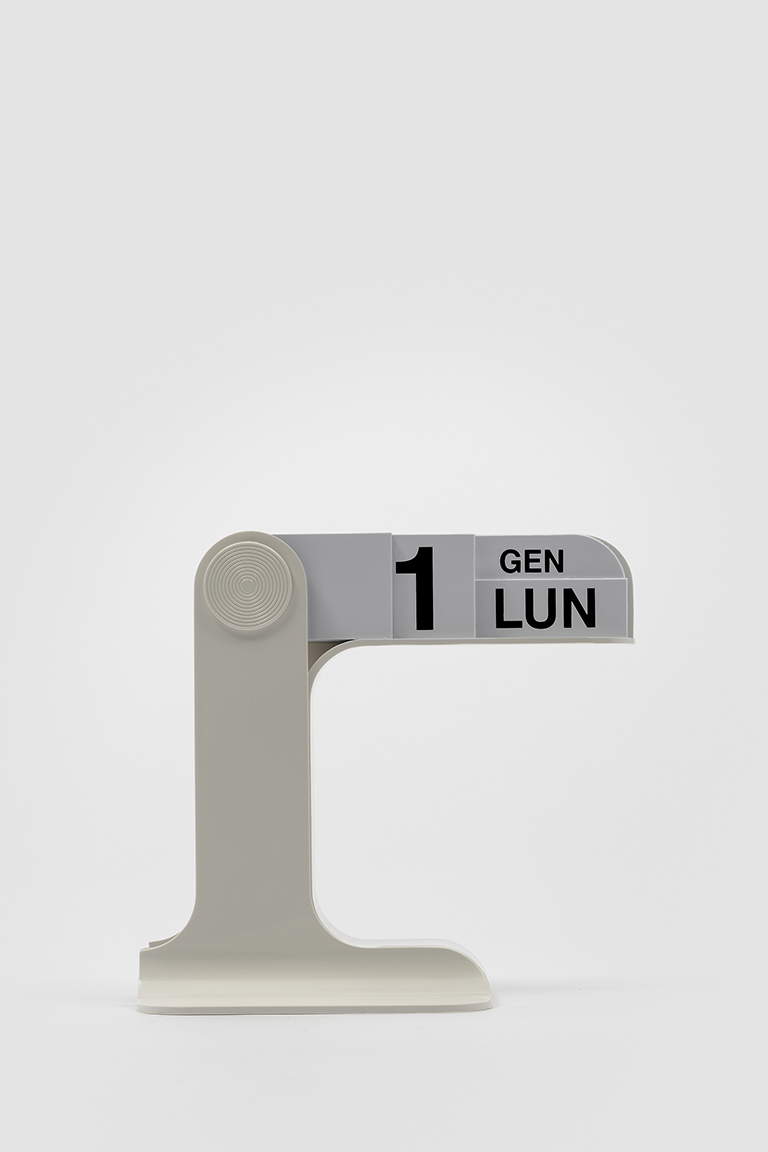
The Timor calendar consists of a base made of ABS (acrylonitrile butadiene styrene), a durable and lightweight plastic material, and a series of lithographed PVC (polyvinyl chloride) pallets that display the numbers of the days, the names of the months, and the days of the week. The pallets are attached to a central pivot that allows them to be easily rotated to update the date (in fact, they fan open allowing only those that make up the daily date to be shown). This modular and dynamic structure makes the calendar not only functional but also interactive, inviting the user to actively participate in the daily update (although Mari would later reconsider: in an interview, some time after Timor’s birth, the designer had this to say that “perpetual calendars always present some substantial difficulties: you have to remember to update them every day, they require interaction. Also, you can’t write on them and they don’t carry vacations or vacations. I don’t want to have to remember to change the date every day!”).
Timor’s aesthetic is minimalist and understated, in line with Mari’s philosophy inspired by the concept of "less is more." The typefaces in Helvetica, a favorite font of both Mari and Danese, are clear and legible, designed to be visible from different angles and in different lighting conditions. The choice of colors, black and white, further contributes to the readability and visual simplicity of the calendar.
Enzo Mari was an ardent advocate of ethical design. His vision was to create objects that were affordable, functional and beautiful, without compromise. Mari believed that design should improve the quality of everyday life. This philosophy is clearly reflected in the Timor calendar, which combines functionality, aesthetics and durability in one object. Mari was also known forhis critical approach to consumerism and mass production: he believed that many industrial products were designed without care for their durability, forcing consumers to replace them frequently. The Timor calendar, on the contrary, is designed to last, with high-quality materials (PVC, by the way, has a very high resistance to skin secretions, so it won’t be ruined by touching it with your fingers), and a timeless design that never goes out of style. A product that knows no epochs, accompanying the life of its owner. “When I make an object for Danese,” declared Enzo Mari, “I think it must survive in whatever formal system it is involved in, the goal being that an object that is good today must also be good three hundred years from now.” And it was precisely the vision shared by Mari and Danese that enabled the creation of an original, innovative product that perfectly embodied the principles of modern design. Indeed, since it was introduced to the market, the Timor perpetual calendar has become an icon of twentieth-century design itself. It has been exhibited in numerous museums of design and contemporary art, including the MoMA in New York, of whose collection Timor is part.
It should also be mentioned that Timor is still on the market today, and is sold in different variants: white or black, with days and months in Italian, English, French, and German, testifying to its excellent response even outside our borders. The Timor’s success can be attributed, first of all, to its ability to transcend fashions and temporary trends, thanks to its timeless style, elegance, and recognizability. And then, its essential and functional design makes it suitable for any environment, from home to office, from modern to traditional. This versatility has also contributed to its longevity and continued popularity. “The Timor Perpetual Desk Calendar,” wrote Charlotte and Peter Fiell, among the most influential design historians, in their book Plastic Dreams. Synthetic Visions in Design (2009), “is one of Enzo Mari’s most beloved design objects. In contrast to traditional desk calendars, this one has an elegant sophistication attributable not only to the designer’s understanding of form, function and materials, but also to Danese’s commitment to ’simple objects of great quality.’ Since its inception in 1957, this Milan-based company has been dedicated to excellence in manufacturing and has always managed to create superlative objects regardless of the materials used. In this case, Mari chose white or black ABS for the stand and for the thirty-two fan-shaped elements decorated with PVC letters in Italian, English, French, or German. The inverted ’J’ shape of the calendar perfectly complements the bold letters-it is an object in which product design and typographic design go harmoniously together. Although the Timor was designed more than four decades ago, it still looks as fresh and innovative as the day it was created, proving that, when handled sensitively and intelligently, plastic can give a product longevity both functionally and aesthetically.”
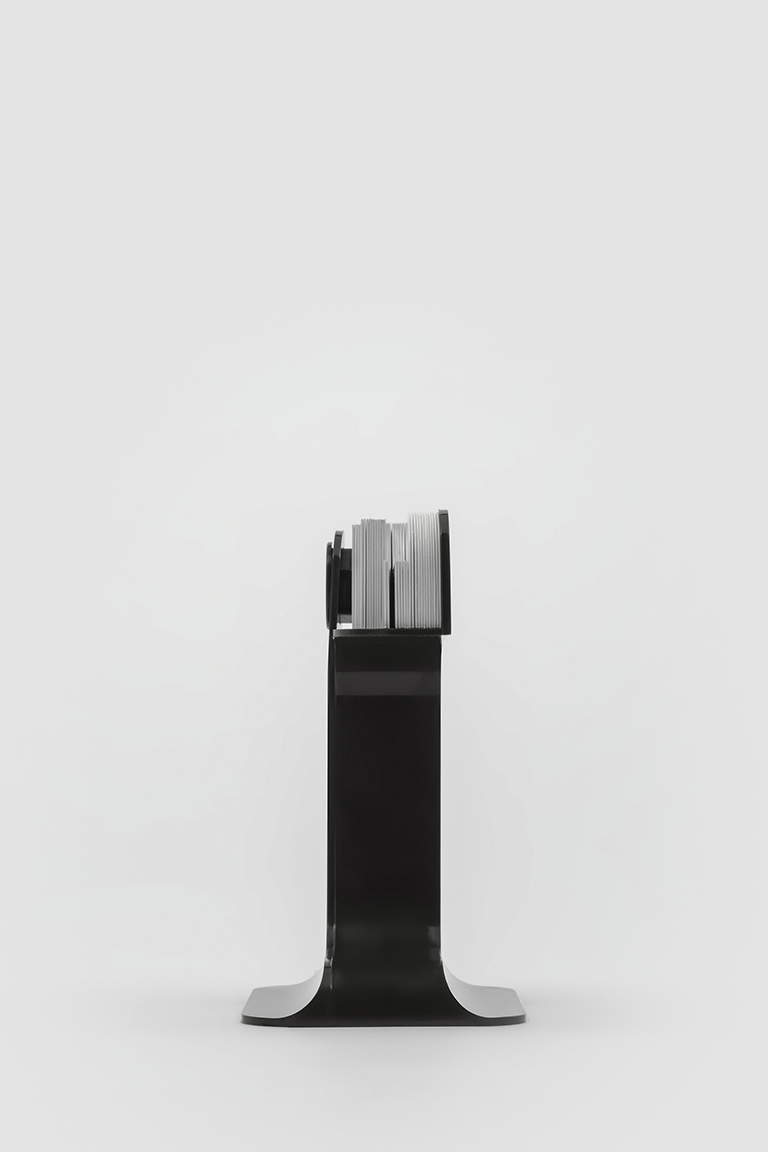
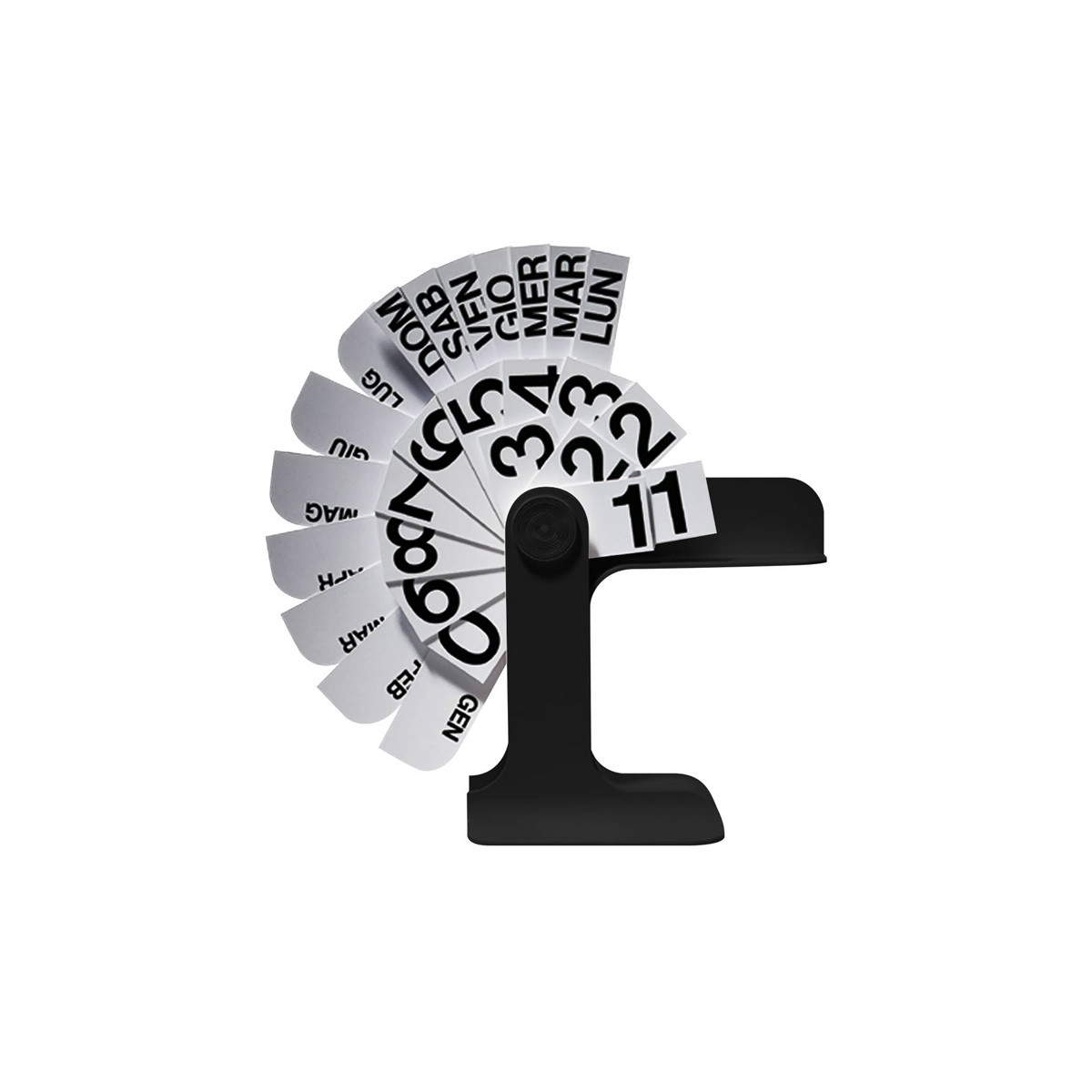
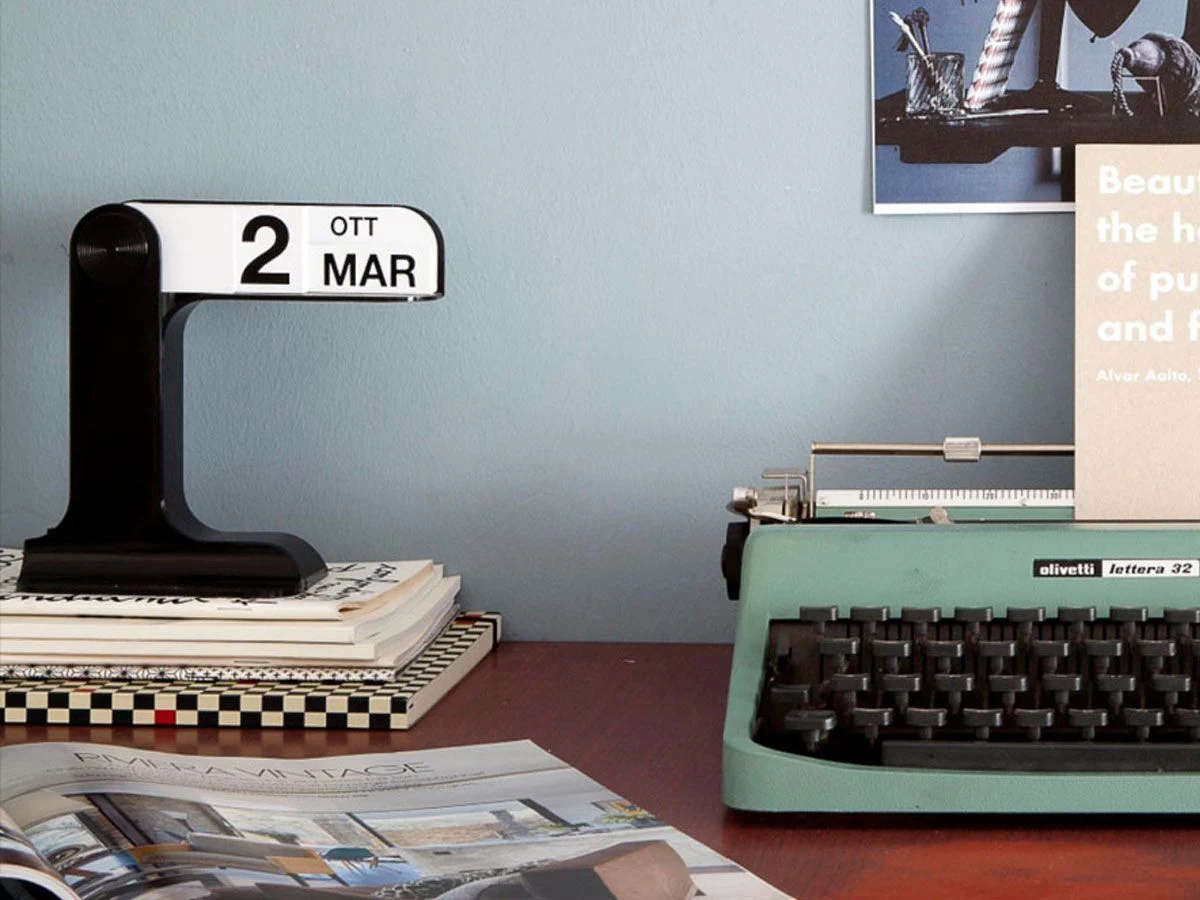
For these reasons, the Timor calendar remains a valued object even today. In an age when digital technology dominates every aspect of our lives, Timor seems to want to offer us a break, a return to simplicity, as if the act of manually changing the date invites its owners to take a moment to reflect on the passage of time. Timor, after all, is an object that has a strong interactive component, since each day its owner must take a moment of his or her time on this calendar to update the date. In addition, Timor continues to be an example of sustainable design. Its durability and timeless design contrast with the throwaway culture, promoting a more conscious and respectful approach to the objects around us.
The Timor Perpetual Calendar is not only a successful product, but also a perfect representation of Enzo Mari’s vision and philosophy. His attention to detail, his pursuit of functional perfection, and his dedication to ethical design are reflected in every aspect of Timor. Throughout his career, Mari has created numerous projects that reflect his design philosophy. From modular chairs and tables to conceptual artwork (Mari has also been an artist), each of his works is characterized by a constant search for perfection and integrity. Timor fits into this context as one of the purest and most successful examples of his design approach. Mari has always sought to go beyond the physical object to explore the deeper meanings and implications of design. Timor, with its simplicity and effectiveness, embodies this quest. It is an object that not only satisfies a practical need, but also communicates an idea of beauty, durability and awareness. Timor by Enzo Mari is, therefore, much more than just a calendar. It is an icon of modern design that has transcended the ages thanks to its functionality, its aesthetics, its elegance, and its design philosophy. Mari created an object that continues to inspire, proving that good design is eternal. A tribute to the genius of Enzo Mari, an object to remind us that design has the power to make our lives better and fuller.
Warning: the translation into English of the original Italian article was created using automatic tools. We undertake to review all articles, but we do not guarantee the total absence of inaccuracies in the translation due to the program. You can find the original by clicking on the ITA button. If you find any mistake,please contact us.